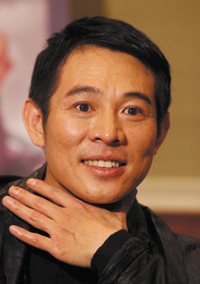| Home / Entertainment / News | Tools: Save | Print | E-mail | Most Read |
| Leaving on A Jet Plane |
| Adjust font size: |
Like Nixon's career at that moment in 1974, Jet Li's film career is near a turning point – or is it? The publicity campaign for Fearless, which came out in early 2006, trumpeted that it would be Li's last martial arts outing. In person, however, Li is less certain. "I have retired from traditional martial arts movies," he says. "I will still make action movies though." At 43, Li seems about to leave behind the tradition that he helped create. His attitude towards wushu, which has shaped his life and much of his filmic repertoire for the past three and a half decades, has changed. "It was when I reached my 30s that I started to think about ways to improve lives – my own and those around me," he says. "I want to show that violence is not the only solution to problems." Buddhism has had a strong influence on Li in recent years, and affected the way he sees his career. "In the past, my understanding of martial arts came from the secular, [the sense] that different countries and cultures have different points of view. Since I converted to Buddhism, I have learnt that all views regarding the external world come from within, not from outside. To let go of the self is to let go of the bias in our worldview," he says. This insight deeply influences Li's most recent film Fearless, which he starred in and produced. "My character in Fearless is close to my experiences in real life," says Li. "China's economy has been growing fast and peoples' lives are much better than in the past. Yet despite this, a quarter of a million people committed suicide in 2003. Fearless was a simple step toward encouraging young people to see clearly through the illusion of life, to discover what is truly important to oneself." For now Li is concentrating his efforts on charity work. In January, the Red Cross Society of China appointed him a "philanthropic ambassador," recognizing his efforts to raise awareness of mental health issues among young people. He has also established his own charity, the ONE Foundation for victims of natural disasters. Li's newfound altruism has not interrupted his acting career. His next film, Rogue, features Li as an assassin who has ignited a bloody crime war between rival Asian mobs. Jason Statham (Transporter) plays an FBI agent determined to bring down Li after his partner is murdered. Filmed in Vancouver, Rogue is currently in post-production. Li is also working with Jackie Chan on a modern-day interpretation of the Chinese literary classic Journey to the West. The collaboration is currently in the developmental stages, with Li playing the monk Tang Seng and Chan playing the monkey Sun Wukong, and both stars sharing the title of executive producer. With the pending Jackie Chan collaboration, Li's retirement from martial arts movies remains to be seen. Regardless, from that historic day on the White House lawn to his recent move back to China, the audience's love affair with Jet Li is easily understood: he and his audience have grown up together and Li's own story continues to develop and flourish. "I've been making movies for 26 years," says Li, "but after all this time, my desire to learn and to do the best I can never wavers. Every new film is a new challenge and I try the best I can to make the movies my fans want to see." (That's Beijing October 25, 2006)
|
| Tools: Save | Print | E-mail | Most Read |
 |
| Related Stories |
|
